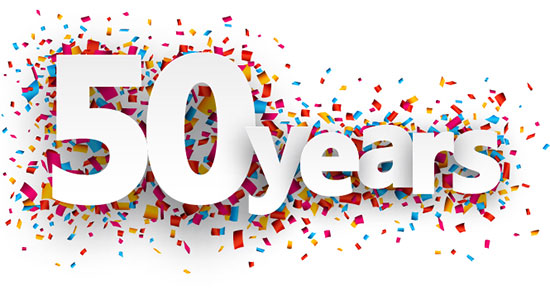From the Archives
Class of 1970 Celebrates 50 Years in the Law in 2020

Members admitted to practice law in 1970 will celebrate 50 years in the legal profession this year. In 1970, Richard Nixon was President and Warren Burger was the Chief Justice of the U.S. Supreme Court.
In a 1970 issue of the Wisconsin Bar Bulletin (now Wisconsin Lawyer), then State Bar President John C. Wickhem highlighted the issue of the day for members of the bar: specialization.
That is, whether to institute a nationwide system for recognizing and regulating legal specialties (other than patent, copyright, and maritime).
Today, most states, including Wisconsin, have ethics rules that prohibit lawyers from claiming they are a “specialist” in a certain field of law unless they are certified by a qualifying organization and identify the certifying organization in the communication.
Those rules sprang from discussions that began 50 years ago.
Got a Nugget to Share?
Send your ideas for interesting facts, trends, tips, or other bits and bytes to wislawmag@wisbar.org, or comment below.
By the Numbers
26%
– The percentage of women judges serving in Wisconsin’s circuit courts in 2019, which is up from 19 percent in 2017.
According to the Wisconsin Women’s Council, “this year-over-year increase puts female circuit court judges among the state’s fastest growing elected offices for women.” Currently, 64 judges (1 in 4) are women, nearly double the number from 2005.
Five of the seven justices on the Wisconsin Supreme Court are women, and six of 16 Wisconsin Court of Appeals judges are women. Still, 43 of 72 Wisconsin counties have no female judges.
“Gender diversity on the bench is often cited as an important factor in public confidence, and perceptions of fairness and equality in the justice system,” said Christine Lidbury, executive director of the Wisconsin Women’s Council. “By bringing more qualified women to the bench, across the state, the system becomes more representative of our population and reflective of the goals and values of all of our citizens.”
On the Radar
Will Online Courts Improve Access to Justice?

Richard Susskind, a renowned commenter on the future of legal services, released a book last month titled Online Courts and the Future of Justice. In it, Susskind notes that 50 percent of the world’s population lives without protection of the law, based on data from the Organization for Economic Cooperation and Development (OECD).
“Even in the world’s most advanced jurisdictions, most civil disputes cost too much, take too long, processes are antiquated, and the whole business is unintelligible to those who are not lawyers,” Susskind writes.
“Inaccess to justice is now a global pandemic.”
The solution? “Online determination of cases by human judges, not in traditional courtrooms but with evidence and arguments submitted online with the judges’ decisions delivered via online platforms,” writes author and blogger George Beaton, discussing the content of Susskind’s book. “While online judging is not universally appropriate, it is well-suited to the disposal of many low value disputes.”
Source: remakinglawfirms.com
Out There
First Dance with Mary Jane

In Michigan, recreational marijuana sales began on Dec. 1, 2019. The Detroit Press reported that marijuana sales exceeded $1.6 million in the first eight days.
“The state House Fiscal Agency has estimated that when the recreational market for marijuana is fully established after 2020, annual sales will approach $949 million, bringing in $94.9 million from the 10% excise tax and $57 million from the 6% sales tax,” Kathleen Gray reported.
In Illinois, recreational marijuana sales began on Jan. 1, 2020, although local municipalities can vote to prohibit marijuana dispensaries within their own municipalities, according to the Chicago Tribune.
Recreational marijuana use (and sales) is now legal in 11 states, 33 states for medical uses – including North Dakota and Minnesota.
Wisconsin is now in the minority of states that prohibits the medical and recreational use of marijuana.
Marijuana use (and sales) is still prohibited by federal law, but a pending bill – the Marijuana Opportunity Reinvestment and Expungement Act of 2019 – would decriminalize marijuana and give states incentives to “provide for expungement of certain cannabis offenses.”
Source: CNBC; Detroit Press; Chicago Tribune
Quotable
“You can’t change what’s happened, but you can control your present and future. Make better decisions and learn from your mistakes.”

– Stephanie Marrone, communication strategist, discussing “Things to Quit in 2020 to Become a Stronger, Better Professional You” at her blog, The Social Media Butterfly. Other tips to think about for 2020:
- Don’t overthink and worry by fixating on things.
- Embrace who you are, be your unique self.
- Don’t compare yourself to others.
- Make time for things that bring you joy.
- Say yes to opportunities that take you out of your comfort zone.
- Surround yourself with people who support you.
- Listen to your intuition.
- Don’t procrastinate, which can cause stress.
Good Idea
Get Paid in 2020

In common arrangements, lawyers perform services for clients and bill for them later, usually at the end of the month.
However, many clients pay late, don’t pay at all, or dispute legal bills – all reasons why the State Bar of Wisconsin maintains a Fee Arbitration Program.
But Ruth Carter, writing for Attorney at Work, suggests two proactive steps to encourage timely payment from clients:
-
Always require a retainer or advanced fee. “Hopefully, this will encourage people who might renege on their obligation to pay their bill to self-select out of working with me, or if they disappear, help ensure that I’ve been substantially paid for the work performed,” Carter wrote.
-
Charge interest. “My client engagement agreement now includes a provision where the firm charges interest when a client is late in paying their invoice,” Carter wrote.
Last month in Briefly, State Bar Practice Management Advisor Christopher Shattuck noted that lawyers may get paid more quickly if they accept electronic payments.
According to one report, 57 percent of electronic invoices got paid within the same day they were billed to clients, with 85 percent paid within one week.
